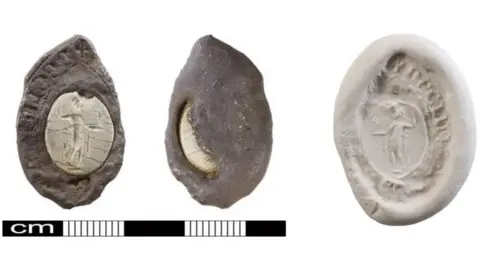Norfolk seal inscription mystery solved by US man on Twitter
 Portable Antiquities Scheme
Portable Antiquities SchemeThe mystery of an inscription on a badly burned medieval silver seal has been been solved by a man in the US on Twitter.
Alex Cortez, from California, read online about a Norfolk-found artefact that was so damaged, its border inscription was too hard to read.
After painstaking research, he discovered the words could come from a particular biblical psalm.
The UK's Portable Antiquities Scheme said it was "really grateful".
The 13th or 14th Century seal, containing a reused Roman carved gem, was found in Gayton by a metal detectorist in August.
Experts had suggested possible letters in the inscription, but Norfolk finds liaison officer, Dr Helen Geake, said it did not appear to show a generic motto and "hoped a Latin scholar might be able to decipher it".
Mr Cortez, from Alameda, who has an interest in archaeology but has never studied it formally, saw a tweet about the find.
He decided to attempt to decipher the message and responded to say it could be Psalm 36:27, "Declina a Malo, a fac bonum".
Dr Geake said the suggestion was Psalm 37 in modern Bibles and meant "decline from evil and do good".
Allow X content?
She said psalm extracts were known from other seal matrices and Mr Cortez had cited the discovery of a 13th Century medieval silver seal matrix in Shropshire in 2006 as "a good parallel".
Industrial procurement specialist Mr Cortez said: "I love a good puzzle, so I started looking at news sites and English archaeology sites to see if I could figure it out.
"I got lucky - I found a news article about a similar piece.
"That one had an inscription that was identified as part of a psalm in Latin - so I had a hunch - what if this was common in the 13th Century, to take an old carved stone and reset it in silver with a psalm?
"So I scrutinized the photos and went through a Latin psalter until I found a likely candidate.
"As it happens, I had a free morning."
You might also like:
Dr Geake said she was "really grateful" to him for "solving the mystery".
Mr Cortez said he felt "very gratified to be able to help".
"I'm no professional, so I hope it shows that anyone with a keen interest and the willingness to do the work is able to contribute something to history," he said. "It has definitely encouraged me."
Dr Geake said she hoped Mr Cortez might "have a look at our hundreds of other hitherto-undeciphered seals and see if more can be understood".

Find BBC News: East of England on Facebook, Instagram and Twitter. If you have a story suggestion email [email protected]
